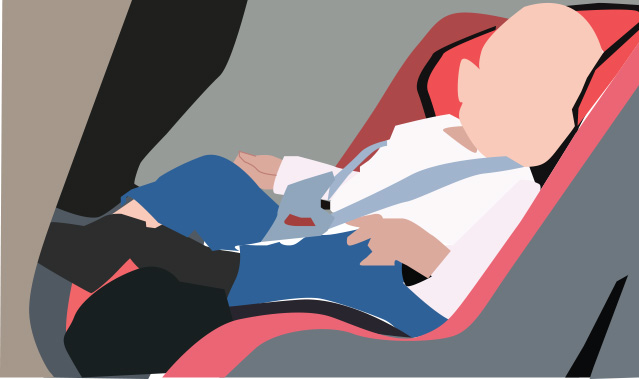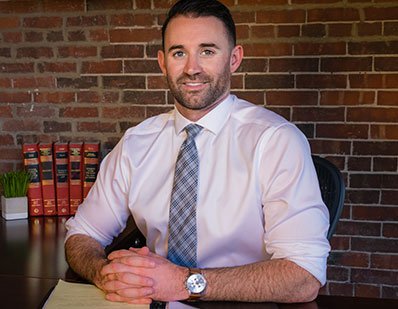Leaving a child in the car for a quick trip to the grocery store may seem harmless. After all, you are only grabbing a few things.
 But the temperature inside a vehicle can rise 20 degrees in just 10 minutes, putting a toddler in serious danger of injury. The child may be locked in a child-restraint seat, unable to escape, and parents don’t realize how quickly the youngster’s body temperature elevates.
But the temperature inside a vehicle can rise 20 degrees in just 10 minutes, putting a toddler in serious danger of injury. The child may be locked in a child-restraint seat, unable to escape, and parents don’t realize how quickly the youngster’s body temperature elevates.
As a child’s temperature rises, the sweating mechanism breaks down and the body can’t cool itself, according to the Centers for Disease Control and Prevention. In a matter of minutes, a child’s body temperature could reach 106 degrees, and heatstroke could occur, causing permanent disability or even death, especially if emergency treatment isn’t provided quickly.
As summer’s heat envelopes New England, parents should take extra precautions against heat stroke in children, especially when 100 percent of vehicular heat strokes are preventable.
Forgotten Children in Hot Cars
- Heatstroke is the main cause of non-crash related vehicle deaths in children 14 and under, with a child dying nearly every 10 days from being left in a hot car, according to the National Highway Traffic Safety Administration.
- Since 1998, 38 children a year on average have died from being left in hot vehicles, according to information compiled by USA TODAY Network.
- In that time, more than 619 children nationwide died from heatstroke in hot cars.
- Fifty-two percent of children who die from being left in hot vehicles were “forgotten” by a parent or caregiver, according to NHTSA.
- The large majority of heatstroke deaths, more than 70 percent, involve children under two years old.
- Nearly a third of these heat stroke deaths, about 30 percent, take place when a child gets into a car without a parent or caregiver knowing it and can’t get out.
- Almost 20 percent of heatstroke deaths happen when a caregiver leaves a child in a vehicle on purpose.
- The temperature inside a vehicle can rise 20 degrees in 10 minutes, reaching 110 degrees even when the temperature outside is in the 60s.
- A child can suffer heatstroke in a hot car when the temperature outside is 57 degrees.
- A child’s body temperature can rise three to five times quicker than an adult’s, and a heat stroke can set in when the body temperature hits 104 degrees. When a child’s temperature reaches 107, death can occur.
Legal Issues

In the New England area, Connecticut is the only state to criminalize leaving a child in a vehicle alone. However, all of the region’s states have laws dealing with the death of a child caused by being left in a hot car, including murder, manslaughter, and risk of injuring a minor.
From 2009 through 2013, Connecticut reported no child heatstroke deaths, although the state has one case from 2014 that remains under investigation, according to a report, Heatstroke Deaths of Children Left in Vehicles, by Katherine M. Dwyer. That record could be the result of stiff penalties in the state, where it is a class A misdemeanor punishable by up to a year in prison and a fine of up to $2,000 to leave an unsupervised child under 12 in a car long enough to cause substantial risk to health or safety.
During that same period of time, Massachusetts recorded two deaths of children from vehicular heatstroke, the last one taking place in 2012.
Fortunately, Massachusetts lawmakers are aware of these dangerous situations and considering action to avert them.
A bill pending in the Massachusetts Legislature would allow a person to be fined for leaving a child eight years old or younger in a car without being accompanied by another person at least 14 years old. First-time violators would face a fine of $200 and second-time offenders would pay $500.
Taking ACTion
Safe Kids Worldwide and the General Motors Foundation have joined forces to initiate a campaign called Never Leave Your Child Alone in a Car. It’s geared toward parents and caregivers and mobilizes police and fire departments, hospitals and doctors’ offices, government agencies, child-care centers, and businesses to warn people about the dangers of keeping kids in hot cars.
It encourages people to ACT:
- A: Avoid the potential for heatstroke-related injury by never leaving a child alone in a car, even for a minute. To keep children from slipping into a car or a car trunk, keep your doors locked, even in the driveway, and put keys and key fobs out of children’s reach.
 C: Create ways to remind yourself of this danger. Put something such as your cell phone or briefcase next to your child’s restraint seat to make sure you don’t leave them in the car, especially if you’re having a hectic day.
C: Create ways to remind yourself of this danger. Put something such as your cell phone or briefcase next to your child’s restraint seat to make sure you don’t leave them in the car, especially if you’re having a hectic day.- T: Take action for others. In addition to focusing on your children, if you see a child in a hot car, do something about it. Call 911 and let emergency personnel deal with the situation. They are trained to handle the situations and bring down a child’s body temperature.
The safety initiative offers a Badge of Courage award to people who take action to prevent children from suffering heat stroke. In addition, Safe Kids backs the NHTSA’s campaign, “Where’s Baby? Look Before You Lock,” which raises national awareness to avert the death of children.
Reminders Best Way to Prevent Heatstroke Deaths
Safe Kids believes public awareness and constant reminders are the best way to avoid these types of tragedies, and it works with the federal government to keep this on people’s minds.
If you or a family has been affected by the death of a child from a heat stroke caused by the negligence of another person, contact the personal injury attorneys at Michael Kelly Injury Lawyers can guide you in the right direction at this difficult time.


 C: Create ways to remind yourself of this danger. Put something such as your cell phone or briefcase next to your child’s restraint seat to make sure you don’t leave them in the car, especially if you’re having a hectic day.
C: Create ways to remind yourself of this danger. Put something such as your cell phone or briefcase next to your child’s restraint seat to make sure you don’t leave them in the car, especially if you’re having a hectic day.